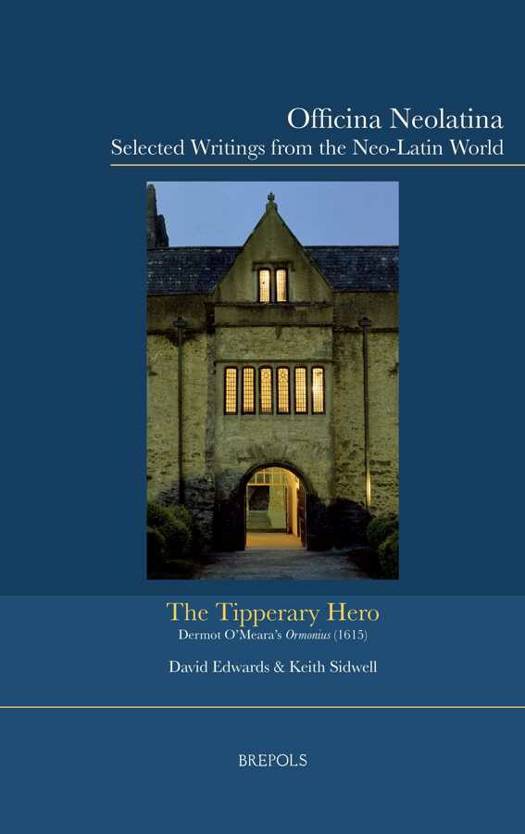
Je cadeautjes zeker op tijd in huis hebben voor de feestdagen? Kom langs in onze winkels en vind het perfecte geschenk!
- Afhalen na 1 uur in een winkel met voorraad
- Gratis thuislevering in België vanaf € 30
- Ruim aanbod met 7 miljoen producten
Je cadeautjes zeker op tijd in huis hebben voor de feestdagen? Kom langs in onze winkels en vind het perfecte geschenk!
- Afhalen na 1 uur in een winkel met voorraad
- Gratis thuislevering in België vanaf € 30
- Ruim aanbod met 7 miljoen producten
Zoeken
The Tipperary Hero: Dermot O'Meara's Ormonius (1615)
Dermot O'Meara's Ormonius
Dermitius Meara, Keith Sidwell
Hardcover | Frans
€ 127,20
+ 254 punten
Omschrijving
The Ormonius is a five-book heroic poem of nearly 4,000 hexameters on the military career of the 10th Earl of Ormond, Thomas Butler, a key figure in the Elizabethan conquest of Ireland. Written by Ormonds fellow-Irishman, the doctor (and Oxonian) Dermot OMeara, it was published in London by Thomas Snodham in 1615, and was probably aimed at James VI & I and his court. Ormond (1531-1614), brought up at the English court and educated with Prince Edward (later briefly King Edward VI), was a powerful warlord in Ireland, but loyal to the English crown. His military activities could easily be represented as those of a scourge for rebels and it is upon this aspect of his image that OMeara focuses. The poem begins with his part in crushing the revolt of Thomas Wyatt against Queen Mary in England in 1554 and then moves to his activities in Ireland, focusing upon relatively minor campaigns against the Scottish Gaels in Ulster, as well as against Shane ONeill, the earl of Desmond, and many other rebels in Leinster and Munster. It ends in the late 1590s with Ormonds involvement in confronting the Tyrone rebellion and the blindness that closed his military career. Although writing a poem firmly within the classical didactic epic tradition, OMeara utilises the framework of a contemporary vernacular Gaelic poetic form called the cathreim in its construction. While specifically intending his creation as a true record of Thomas Butlers deeds, OMeara nonetheless makes use of the divine machinery of Vergil to underline the idea that the inspiration for rebellion comes from Hades, while the power of kings is underpinned by Heaven. Though borrowing heavily from the poetic stock of Vergil, Ovid, Silius Italicus and Claudian (to say nothing of and Lucretius, Lucan, Seneca, Valerius Flaccus and Statius), OMeara creates an entirely (early) modern work, which produces through the medium of the learned language a classically enhanced reflection of the world in which he lived, ideologically slanted towards an Ireland firmly attached to the British Crown. The edition includes a detailed historical and linguistic introduction, Latin text with conspectus fontium and apparatus criticus, English translation into blank verse with accompanying footnotes explaining historical and literary allusions, a full line-by-line commentary on linguistic, literary and historical matters, and detailed indices of ancient authors, Latin grammar, Latin metre, Latin names, English material and noteworthy Latin vocabulary. The edition has been prepared jointly by Keith Sidwell, Emeritus Professor of Latin and Greek at University College Cork, former Director of the Centre for Neo-Latin Studies and Adjunct Professor in the Department of Greek and Roman Studies, University of Calgary, and Dr David Edwards, Senior Lecturer in History at University College Cork and Director of the Irish Manuscripts Commission, author of a recent monograph on the Butler Lordship.
Specificaties
Betrokkenen
- Auteur(s):
- Uitgeverij:
Inhoud
- Aantal bladzijden:
- 798
- Taal:
- Frans
Eigenschappen
- Productcode (EAN):
- 9782503532301
- Verschijningsdatum:
- 22/02/2012
- Uitvoering:
- Hardcover
- Formaat:
- Genaaid
- Afmetingen:
- 165 mm x 249 mm
- Gewicht:
- 1587 g

Alleen bij Standaard Boekhandel
+ 254 punten op je klantenkaart van Standaard Boekhandel
Beoordelingen
We publiceren alleen reviews die voldoen aan de voorwaarden voor reviews. Bekijk onze voorwaarden voor reviews.









